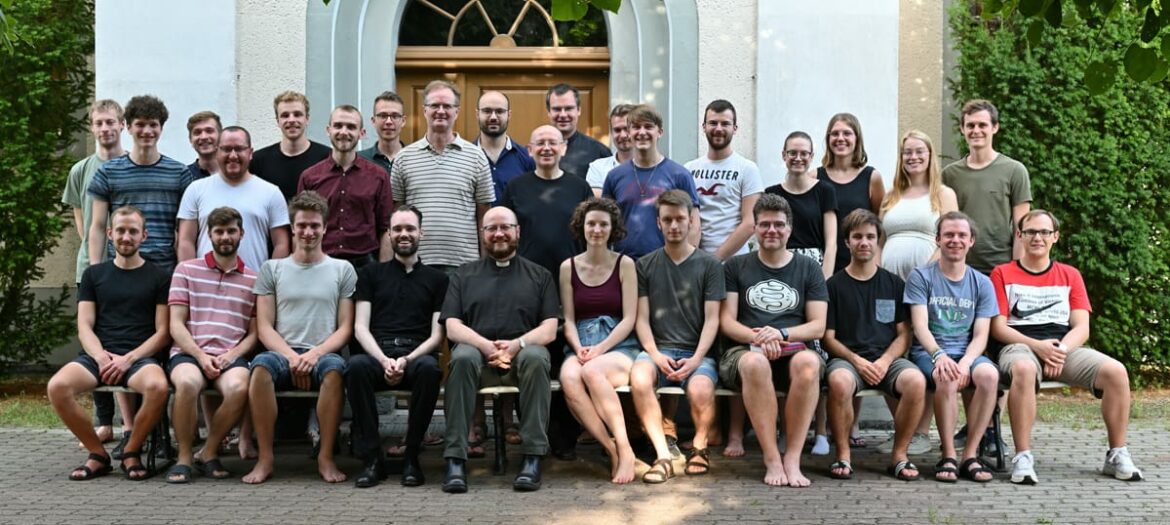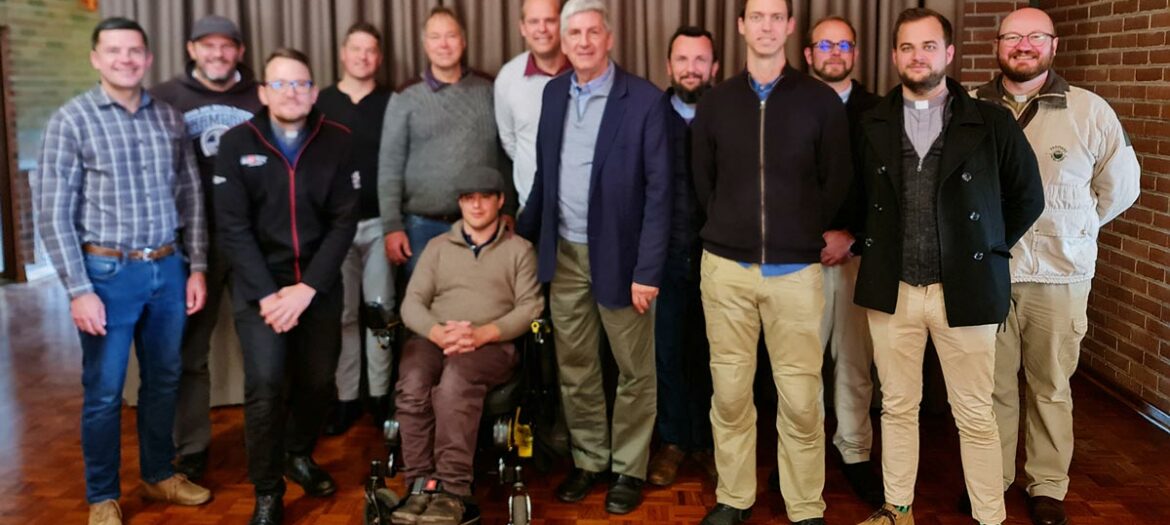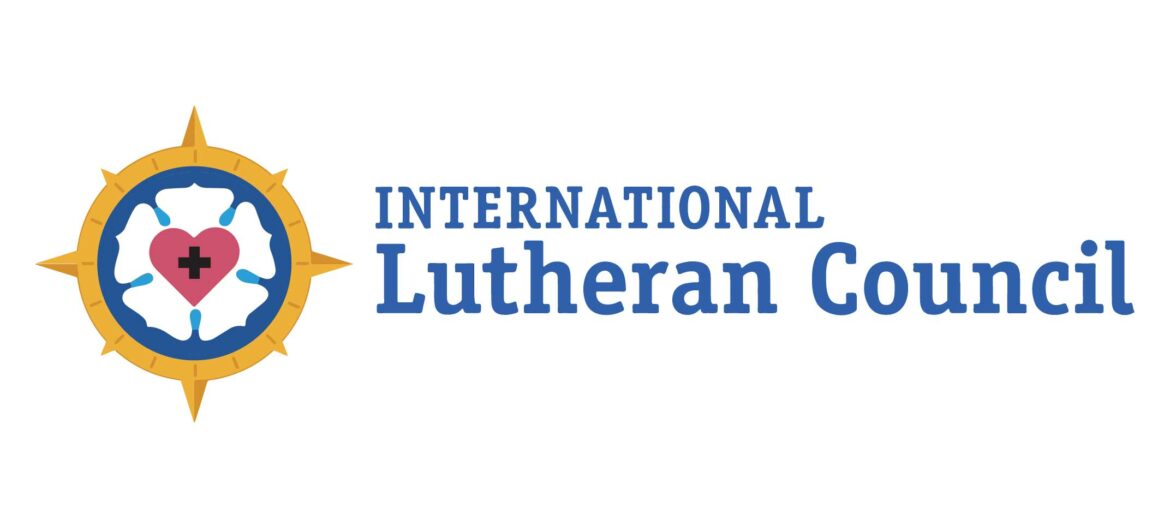A report by selk_news / Hinrich Brandt, abridged for BLK
From the 23rd to 27th of August, the “5 Tage Weigersdorf” (5 days in Weigersdorf, Germany) retreat took place, to which Pastor Karl Böhmer (Kirchdorf) was invited as the guest speaker. Weigersdorf is located between Dresden and Görlitz, in the east of Germany. The 34 participants focused on the topic “The justified give account of hope”. Pastor Böhmer gave the main lecture in three parts:
In the first part, he dealt with the topic under the heading “The Holy Scriptures give reason and hope”, asking the question: “How do Christ and Christians give account?” Based on the Bible verse from 1 Peter 3:15, Böhmer made it clear that the keyword “accountability” in the context of the text refers to “giving account to people”, which falls within the area of apologetics. This is about the intellectual justification of faith, about speaking and answering critical questions. As Böhmer demonstrated on the basis of biblical texts, such intellectual justification of faith also involves evidence or proof of divine action. Jesus himself also gave account of his actions to people through evidence. Böhmer illustrated this idea by highlighting the account of Jesus healing the paralysed man in the Gospel of Matthew, chapter 9, verses 1 to 8. He continued with other biblical texts that make it clear that the Christian faith is based on accountable, historical facts.
During the second part, Pastor Böhmer dealt with the topic under the heading “Holy Scripture is a reason for hope” and posed the question: “Can the Christian faith be refuted?” Since Christian apologetics is about far more than arguments in favour of the existence of God, it cannot be pursued without God’s Word, “because only the Holy Spirit can create faith and has bound himself to the Word of God.” Christian apologetics can play a role here in two ways: (1) by “understanding and practising prayer as a purposeful, personal proclamation of the Word of God”; (2) “by aiming for an open ear for the Word of God, by removing obstacles that may prevent agnostics or atheists from confronting the Word of God and allowing it to have an effect on them.”
Böhmer then named three objections that are often encountered in apologetics: “1: The Bible cannot be taken seriously – after all, it is just a human work like any other, which is tainted with errors, prejudices and wishful thinking. 2: Miracles don’t happen, so the miracle reports in the Bible can’t be true. 3: This is especially true for the resurrection of Jesus Christ from the dead.” Böhmer responded knowledgeably to all three objections and rebutted them in an accountable manner.
The third part was centred around the three keywords: “Love, power and evil” and again it was a question that turned into a statement at the end: “And still a reason for hope?”! In this part, Böhmer focused in on the problem of evil. Böhmer: “The problem of evil is just as relevant today as it was 3,000 years ago. God is love; God is omnipotent and yet, evil still exists. Is there any proof that we can still trust God? I believe there is. At the core, at the heart of the Christian faith, there is not only a resurrection, but also a cross. To the atheist or agnostic who asks you to account for the hope that is in you – tell them: at least listen to what the Christian faith actually teaches and professes before you reject it! The Christian believes that the man on the cross is God incarnate. That’s a bold claim! But hang on a while longer: if this is true, if Jesus Christ was indeed God in the flesh, then this raises a profound question: What is God doing on the cross?”
On dealing with evil, Böhmer said: “I would like to plead for us to stop talking about God ‘allowing’ evil in our conversations, in our thinking, in our pastoral care and in our sermons in order to protect him.” We must leave open the possibility that God sometimes causes destruction himself, as the Scriptures testify. Secondly, the speaker reminded the audience of lament and the Psalms of lament: “We have not only forgotten how to fear God, but also how to lament. God wants us to turn to him in joy and sorrow. To this end, he gives us the Psalms of lament, which put the right words of complaint about evil into our mouths and invite us to address them to God. The right way to deal with suffering is to lament. Not in the sense of complaining and self-pity. But in such a way that we bring our suffering to the right address. More than a third of the Psalms are Psalms of lament!”
To summarise, Böhmer reminded us that God is indeed omnipotent, that he really does love people in Christ and that through the resurrection of Jesus Christ from the dead he has given them a reason for living hope, which believers gladly give account of.
In addition to the main lectures, there were further workshops on the topics of “Jesus and money – observations from the Gospels” (SELK pastor Johann Hillermann | Berlin) and “Biblical contexts based on Luke 24:1-49” (Pastor Hinrich Brandt | Greifswald).
As every year, the retreat was characterised by devotions, which were held in the form of the traditional daily prayers. There was also the opportunity for individual confession, a choir led by cantor Georg Mogwitz (Leipzig) and participants Niklas Krüger (Berlin) and organist Lukas Huber (Stuttgart), but also sports, swimming, games, time to relax and for personal discussions.
Next year, “5 Tage Weigersdorf” is planned from the 21st to the 25th of August. Dr Jonathan Rehr (currently vicar in the Salem parish in Tarmstedt) has been secured as the keynote speaker. The theme of his lectures is “The Holy of Holies”.
Further information on the work and the next meeting of “5 Tage Weigersdorf” can be obtained from Pastor Hinrich Brandt (e-mail: Greifswald@selk.de.)




